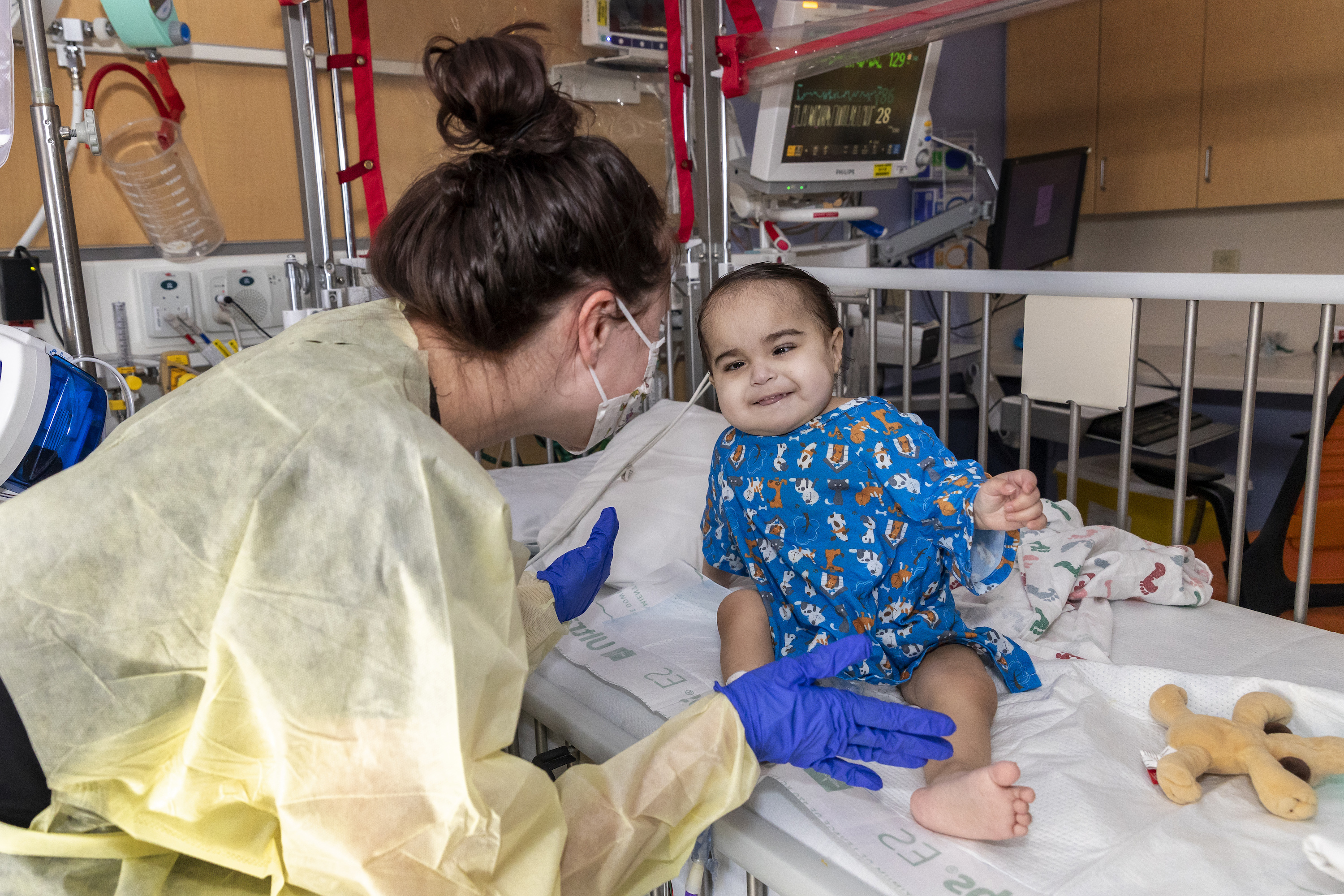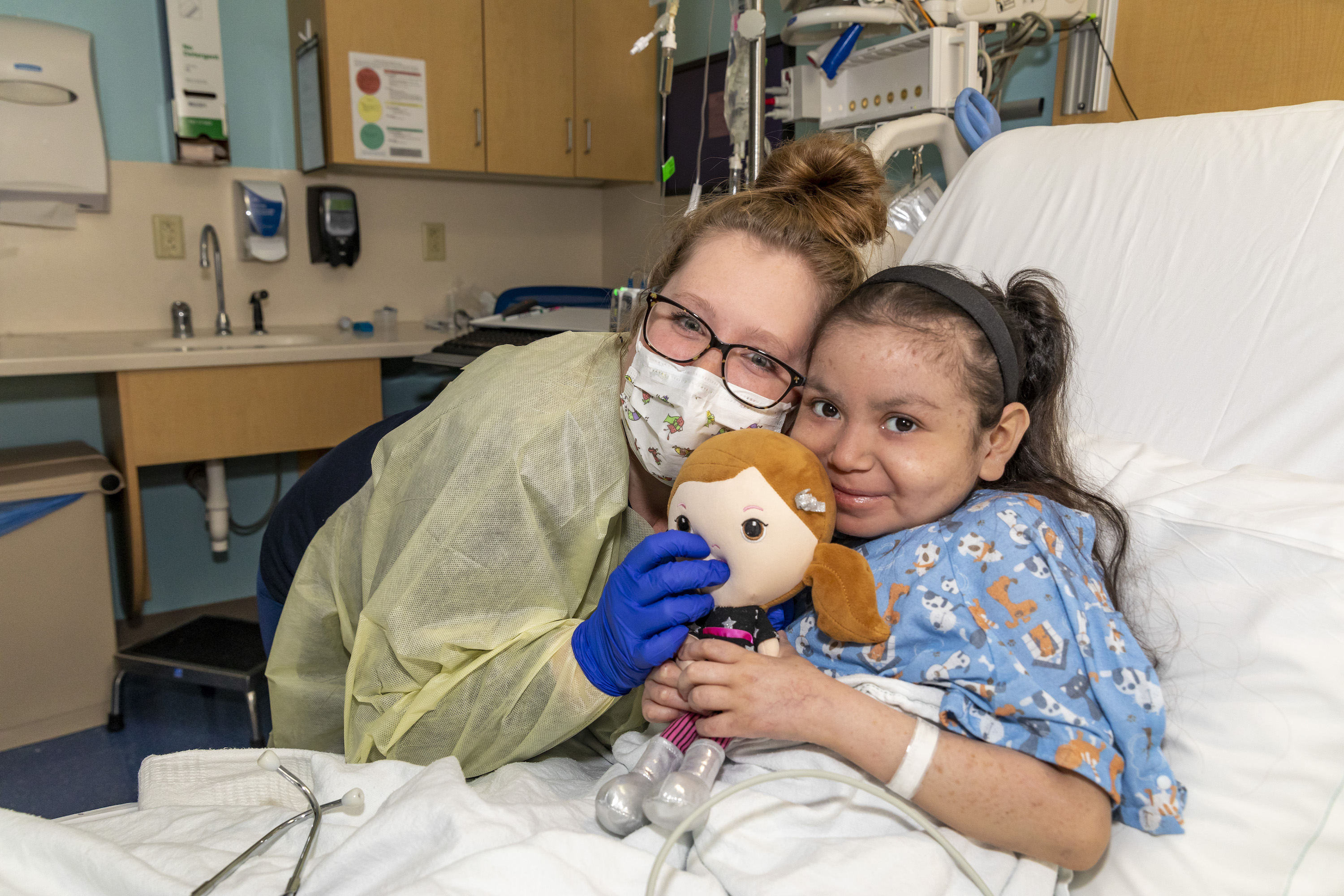Newborns, infants, children, and young adults with congenital heart defects, cardiovascular disorders, and those recovering from heart surgery or transplant receive care in the cardiovascular intensive care unit (CVICU) at Johns Hopkins All Children’s Hospital in St. Petersburg, Florida.
What is a cardiovascular intensive care unit?
In the cardiovascular intensive care unit (CVICU), patients requiring specialized cardiac care, including those recovering from surgery or other procedures, receive advanced care from a multidisciplinary team of experts.
The team is led by physicians with specialized training and experience in pediatric cardiac critical care medicine who staff the CVICU 24 hours a day, seven days a week. Our multidisciplinary team also includes cardiologists, heart surgeons, nurses, respiratory therapists, physical and occupational therapists, speech and feeding therapists, pharmacists, dietitians, and other pediatric experts all dedicated to meeting your child’s individual needs.
We treat a range of cardiovascular conditions in the CVICU, including:
- Congenital heart defects
- Care after cardiac surgery and complex catheter interventions
- Complex arrhythmias, including supraventricular tachycardia
- Heart failure and heart transplantation
- Myocarditis
- Pulmonary hypertension
Why Choose Johns Hopkins All Children’s
You are the most important member of your child’s care team.
Our care is patient- and family-centered, which means that we believe your child is best served by directly involving you and your family throughout your child’s treatment. We strive to make sure you fully understand your child’s diagnosis and treatment plan and encourage you to ask questions and play an active role in your child’s care.
Providing your child with safe, high-quality care is at the forefront of everything we do.
Our experts provide an individualized treatment plan that meets your child’s unique needs, and we are committed to sharing our experience, outcomes, and safety measures to give you the best information available about our program. You can learn more about our heart surgery program’s outcomes by viewing our Patient Safety & Quality section.
Our patients receive highly specialized care.
The CVICU team provides a full range of advanced cardiovascular support services, including mechanical support of the heart with both extracorporeal membrane oxygenation (ECMO) and ventricular assist devices (VAD). We are designated as an ECMO Center of Excellence by the Extracorporeal Life Support Organization (ELSO), and we were the first pediatric center in Florida to use a ventricular assist device (VAD).
Children who need a heart transplant are also cared for in the CVICU after surgery. We work closely with the board-certified pediatric heart surgeons and pediatric cardiologists in the Heart Institute to provide expert care for these patients. Our pediatric heart transplant program has performed more than 190 neonatal and pediatric heart transplants.
While your child is in the CVICU they will be cared for by our highly skilled Magnet® designated nursing team. Magnet® designated is the highest recognition a hospital can receive for nursing excellence and high-quality patient care, from the American Nurses Credentialing Center. The nursing team at Johns Hopkins All Children’s is committed to compassionate, safe, family-centered care. Learn more about our nursing team.
We support your child and family’s emotional needs.
The Child Life team helps our patients to feel more comfortable while they are in the hospital. Child Life specialists use developmental, educational, and therapeutic interventions and play to help patients and families cope with treatment and hospitalization. We have a dedicated Child Life specialist who works with children in the CVICU, using age-appropriate activities to help them cope with stressful health care experiences.
What to Expect in the CVICU
Families play an important role in our patients’ care, and we work to ensure you are directly involved in your child’s care throughout their treatment. Depending on your child’s health needs, certain interactions with your child may be limited. You and your nurse will work together so you can bond with your child while keeping them safe. If at any time you have questions or concerns, please speak with your nurse.
Morning rounds
Every morning and evening, the medical team will be at your child’s bedside to discuss results, necessary changes, and the plan of care.We encourage you to participate during rounds to stay up to date with your child’s care plan.
Communicating with your child’s care team
Even if you are not available to join rounds at your child’s bedside, the team will always be available to update you and answer any questions you may have by phone. Family meetings may also be scheduled outside of rounds to discuss your child’s progress and are periodically scheduled with other specialists who may be involved in your child’s care.
We provide qualified interpreters for languages other than English and for Sign Language (ASL) are available for our patients and their families. Learn more about our Language Interpretation services.
You can also use MyChart to communicate with your child’s providers, in particular after your child has been discharged. MyChart allows you to send secure messages to your child’s providers, renew their prescriptions, and view lab and test results.
Access for parents and family members
The parents or guardians of patients in the CVICU can be with their child any time of the day or night. All our patient rooms in the 22-bed CVICU are private rooms with space for parents to stay overnight.
All visitors must get a daily visitor pass from the Information Desk in the main hospital lobby, or at the Visitors Desk in the Outpatient Care Center (OCC). There may be times when children younger than 10 years old may be unable to visit to help protect our patients. Learn more about our visitor guidelines.
After surgery and follow-up care
Throughout recovery, specialized therapists will work with your child to help them regain strength and skills before going home. Physical therapists and occupational therapists will assess your child after surgery and work with them to reach post-operative developmental skills. Therapists may refer your child to outpatient therapy after discharge to continue working on their developmental skills.
After surgery, it is common for infants and newborns to need extra help to learn how to eat. Speech language and feeding therapists may evaluate your child and work with them to improve feeding.
Before your child goes home from the hospital, you and your child’s care team will complete a discharge checklist. The checklist will be given to you at the start of your child’s hospital stay so that you can ask questions and understand your role in your child’s progress.
The checklist includes things like making sure you know how to care for your child once you are home, car seat safety, and scheduling appropriate follow-up appointments before leaving the hospital. Your child’s nurse will keep track of your family’s progress throughout your child’s stay, and if at any point you have questions about the discharge process, your child’s nurse can answer your questions.
Learn more about the CVICU.
-
Meet Our CVICU Team
Meet the cardiac critical care specialists in our CVICU.

-
Patient and Family Support
We understand that having a child in the CVICU can be a difficult experience that impacts the whole family. Learn more about some of the resources available to support you and your family during your child’s treatment.

Contact Us
For more information about the CVICU, please give us a call at the phone number below. We serve families in the greater Tampa Bay area and beyond.

